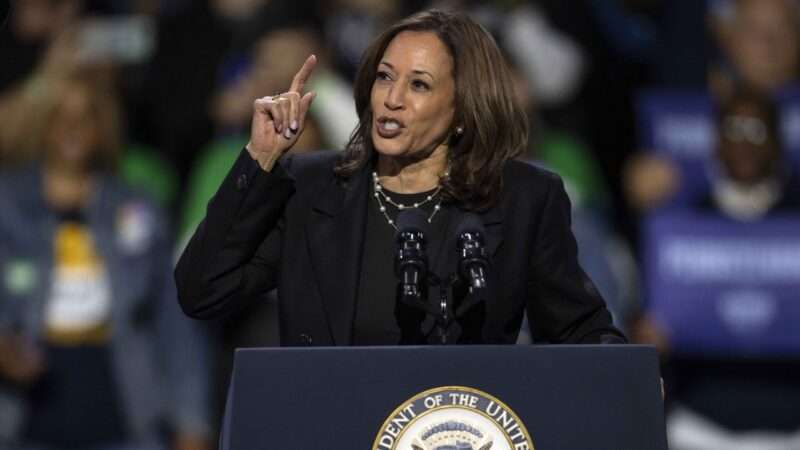
Kamala Harris, the first major-party presidential candidate to support repeal of the federal ban on marijuana, is presenting that step as part of her "agenda to give Black men the tools to build wealth and achieve financial freedom, lower costs for themselves and their families, and protect their rights." Whatever you think of that framing, which is a transparent ploy to lure African-American voters who might be tempted to vote for Donald Trump, it is reassuring that the vice president has not abandoned her advocacy of national legalization, which she backed as a California senator in 2018 and 2019.
Unlike President Joe Biden, who touted his "marijuana reform" but resisted the idea of descheduling cannabis, Harris promises to "legalize marijuana at the federal level to break down unjust legal barriers that hold Black men and other Americans back." That position also sets her apart from Trump, who has endorsed recreational legalization in Florida but has not said anything about resolving the conflict between state and federal marijuana laws.
Harris' proposal is short on details, but it sounds like her legalization plan includes expungement of marijuana-related criminal records and "social equity" provisions that aim to assist would-be cannabis suppliers from communities disproportionately harmed by the war on drugs. Both of those were elements of the Marijuana Opportunity Reinvestment and Expungement Act, a bill she introduced in 2019.
That bill would have created "an automatic process" for "the expungement, destruction, or sealing of criminal records for cannabis offenses." It also would have created "a trust fund to support various programs and services for individuals and businesses in communities impacted by the war on drugs," using revenue from a 5 percent federal tax on cannabis products.
Harris envisioned a Community Reinvestment Grant Program, which would provide grants to "administer services for individuals most adversely impacted by the War on Drugs," and an Opportunity Trust Fund, which would "assist small business concerns owned and controlled by socially and economically disadvantaged individuals." The latter fund also would have supported state and local "equitable licensing" programs aimed at "minimiz[ing] barriers to cannabis licensing and employment for individuals most adversely impacted by the War on Drugs."
Expungement would be a welcome complement to legalization. During his 2020 campaign, Biden promised to "automatically expunge all prior cannabis use convictions," and he later claimed he was "expunging thousands of convictions." But that was not true, since expungement of federal records would require new legislation.
"Equitable licensing," by contrast, is a well-meaning but misguided concept that unfairly puts qualified applicants at a disadvantage, distorts the cannabis market, and delays the rollout of legalization. Harris says her current plan will create "opportunities for Black Americans to succeed in this new industry." While working with Congress to legalize "the safe cultivation, distribution, and possession of recreational marijuana," she says, she will strive to ensure that "Black men—who have, for years, been overpoliced for marijuana use—are able to access wealth and jobs in this new market."
According to a Gallup poll conducted last October, 70 percent of Americans—including 87 percent of Democrats, 70 percent of independents, and 55 percent of Republicans— support marijuana legalization. As relevant here, Gallup put support among "people of color" at 72 percent. A Pew Research Center poll conducted in January found less support for recreational legalization: 57 percent overall. Notably, support was especially strong among black respondents, 65 percent of whom said marijuana should be legal for both recreational and medical use.
In a roundup of cannabis industry reactions to Harris' stance, Forbes writer Iris Dorbian quotes Ethos Cannabis CEO Gibran Washington, who welcomed the candidate's plan as a "landmark shift that will catalyze both industry growth and scientific advancement." Anthony Coniglio, CEO and president of NewLake Capital Partners, which serves marijuana businesses, was more cautious, noting that legalization will require politically iffy congressional action. "While we applaud Harris' commitment to addressing the harm caused by the War on Drugs and the disproportionate impact of mass incarceration on communities of color," he said, "it remains unclear if there will be enough bipartisan support to fully realize her reform proposals."
Sundie Seefried, CEO of SHF Holdings, which provides financial services to the cannabis industry, noted that "states have developed their own regulatory frameworks over years, and forcing them to adjust to federal standards could create substantial complications." Although "the intent is good," she said, the "significant challenges" posed by reconciling state and federal regulations could "delay progress for the industry."
Will highlighting her support for federal legalization help Harris with wavering black voters? If Trump is worried, there is a straightforward way to neutralize any advantage the issue might give her. He could reinforce his avowed support for marijuana federalism by joining her in opposing the main obstacle to it.
[This post has been updated with additional discussion of expungement and "social equity" programs.]
The post Kamala Harris Promotes Federal Pot Legalization As a Boon to Black Men appeared first on Reason.com.







